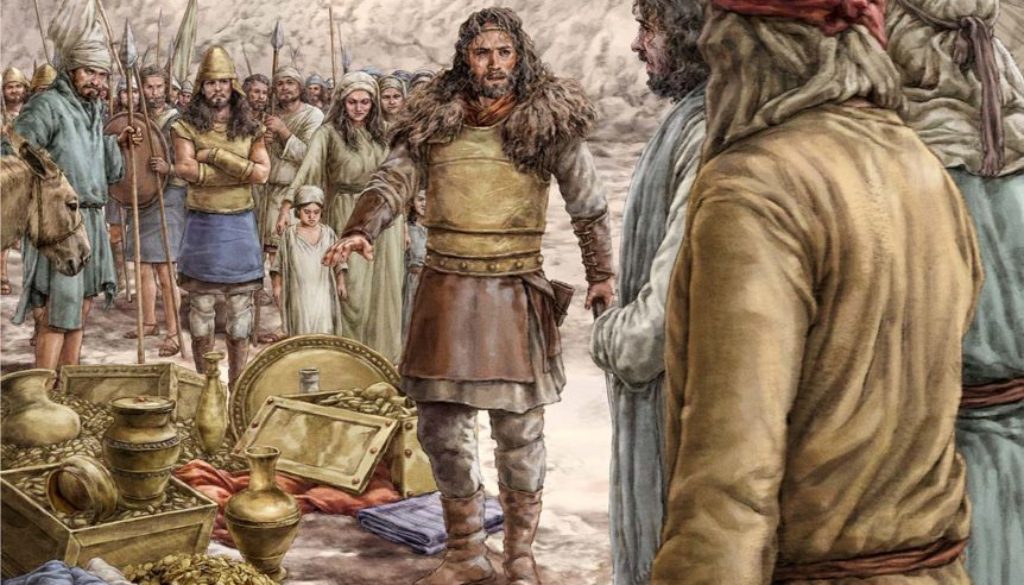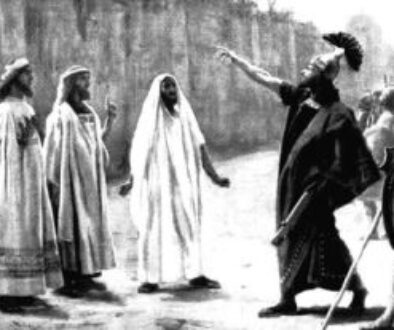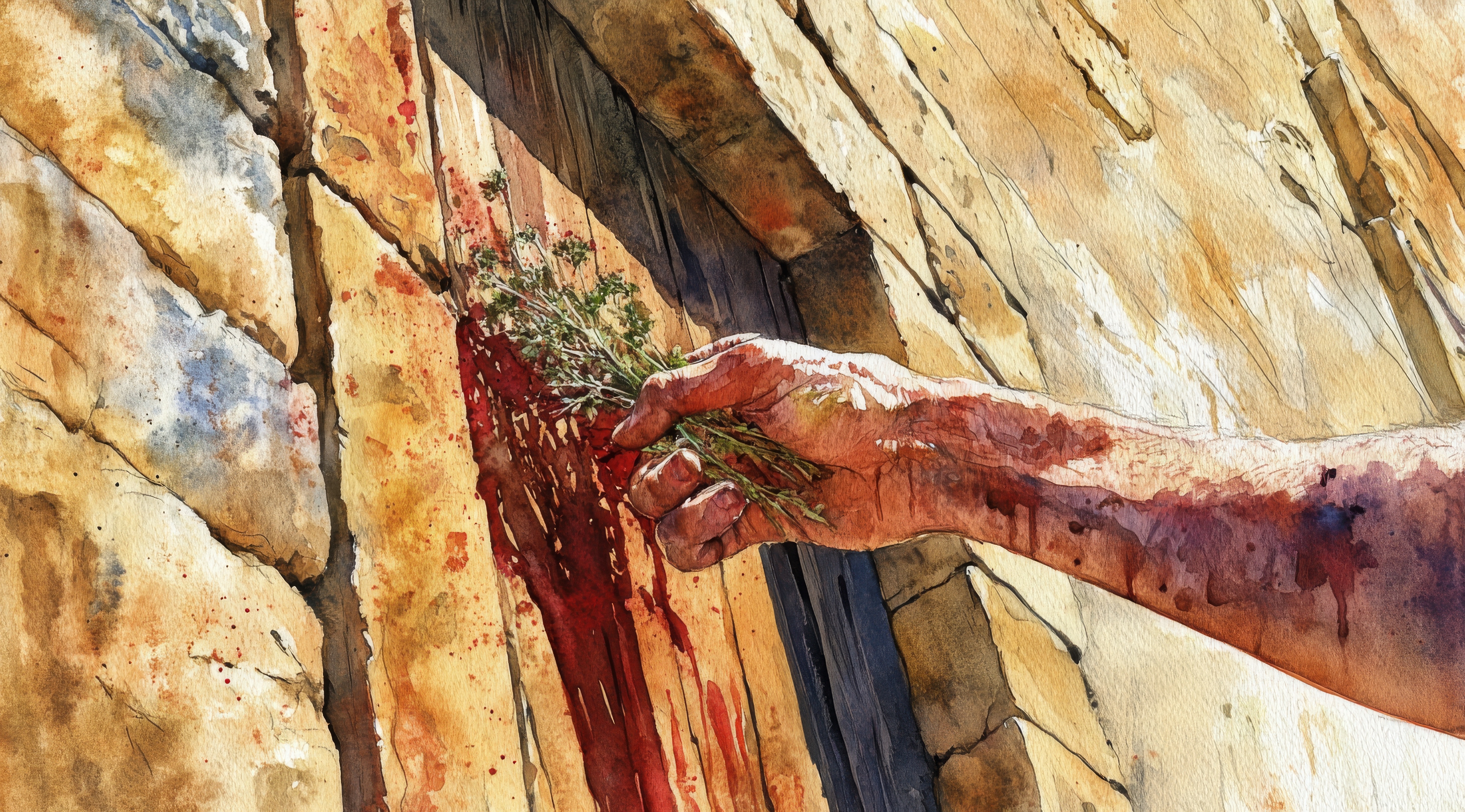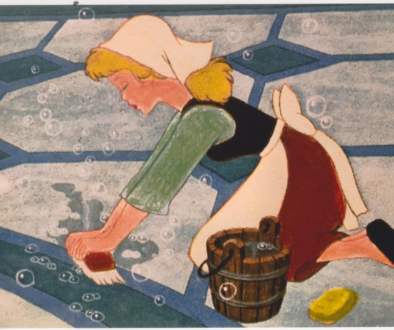1 Samuel 27:1-12 Enemy Camp
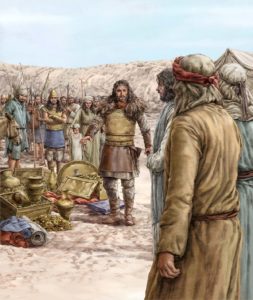
David, fleeing from Saul goes to stay in the enemy’s camp. He and his people seek refuge with the Philistines.
David has been running from Saul for years. Two times now David has personally spared Saul’s life. Both times Saul walked away from the encounter with a promise to let David be. Both times he stated that he knew that David would inherit the kingdom. The first time he even had David swear that he wouldn’t cut off Saul’s house when David did become king. This was already a promise David had made to Jonathan so he had no trouble making it again to Saul.
The problem was that David didn’t trust Saul to keep his promises. Saul continued to be tormented by an evil spirit and provoked into acting by others with their own agendas. David had seen first-hand how Saul’s moods changed. He wouldn’t trust Saul’s promise this time either. Let’s see where his distrust leads him in today’s story.
♥ ♦ ♥
David watches as Saul and his army fades from sight. David’s heart is troubled. Saul’s words were sweet to his ears. Saul repented and promised to do no more harm to David. Oh if only he could take those words and believe in them. He could go home. He could stop this never ending cat and mouse game. But he dare not trust his king. He still bore the mental scars of the near misses suffered at Saul’s hand and the abundance of apologies offered after each encounter. No. He refused let to himself and those who depended upon him fall prey to Saul again.
David has already been working on a plan. He gave partial voice to it when he confronted Saul. Until that moment he hadn’t spoken the words. Now that they have passed his lips they won’t leave his mind. “Now I shall perish one day by the hand of Saul. There is nothing better for me than that I should escape to the land of the Philistines. Then Saul will despair of seeking me any longer within the borders of Israel, and I shall escape out of his hand” (verse 1).
David and Abishai have to reunite with the rest of the group first. There is much ground to cover before they are joined with their families. David’s camp made off during the night while he was occupied with Saul. Their route was to the south but no destination was established before the two groups parted. There is also no telling how far they were able to travel under cover of darkness. As the two men journey, David dares to weigh his thoughts against Abishai’s.
“What did you think of Saul’s words?”
“Which words are troubling you my lord?”
“His words of remorse and promise to halt in his pursuit of me trouble me the most.”
“And why would that be?”
“I wonder how genuine his words are. Do you believe he will honor them?”
“He spoke such words once before, to my knowledge, yet he came for you again. This does not bode well for the strength of his promises.”
“No. It does not.”
They walked on in quiet companionship for some time. David wants to share his plan with Abishai but he is worried. “What if he rejects it? Will I lose his confidence? Will the others follow me? Will I be left alone and in the hands of my enemies?” He can hold it in no longer. He has to give voice to his decision. He may as well start with the one man who jumped at the chance to go with him to Saul’s camp.
“Abishai my friend, I have need of your counsel.”
“I stand ready my lord.”
“I have no faith in Saul’s words. I must do something to protect myself and those who follow me.”
“You have been diligent in doing so but he comes ever closer with each passing day.”
“There is one place where we can go where I do not believe he will seek us.”
“Where might that place be and why have we not journeyed there already?”
“It is the land of the Philistines.”
“Tis truth in that! Saul would not cross into the land of the Philistines, but would we be safe there ourselves?”
“I have a plan for that. I would that we offer our services as men of valor to the Philistines in exchange for safety within their borders.”
“Fight FOR the Philistines! NO my lord! That would put us in battle with our own brothers!”
“We would not fight Israelites. We need only convince the Philistine lords that we are loyal to them.”
“How would we do that without battles to lend credence to our words?”
“This will take some time to lay out fully. I need know now though if you trust me enough to follow me and if you believe the others would do so too.”
“I would follow you to the very bowels of Hell itself! I trust you with my life. You are the Lord’s chosen to lead Israel.”
“Your words strengthen my heart more than you know.” David pauses before asking; “And what of the others?”
“I cannot speak for all, but I believe most feel as I do. You are the future of Israel. The Lord has laid us in your hands.”
David draws encouragement from Abishai’s words but also feels the weight of them. The Lord has put these people in his hands. It is his responsibility to protect and guide them; both physically and spiritually. Will he be able to do both OR either in the land of the Philistines?
After a full day walking, David and Abishai see the trailing edge of their people’s procession. David is thankful that the two of them were able to travel so quickly. That, and the fact that the camp travels much slower.
David calls out in greeting and word travels quickly through the ranks until it reaches all ears. Upon hearing this welcome news Joab sends runners back to David seeking instructions. “Is Saul in pursuit? Are we safe? Do we continue our march or find a place to rest?” These are the questions born to David on the fleetest feet in the camp.
David is pleased with Joab’s focus. He has indeed left the people in capable hands. Word is relayed forward instructing Joab to find a suitable place to make camp, along with the reassurance that Saul has turned back. What he did not pass forward was his concern for how long that “turning back” would last.
As it was nearing evening, a defensible place had already been located. Once they reach this location the men begin erecting tents while the women turn to preparing the evening’s meal. They have performed this task so many times now that all know their tasks without need of direction, including the children and most of the animals. All is in order before the sun fades from the sky, beginning a new day.
David and his captains meet after evening meal to discuss their next steps. Looking at the faces gathered before him, David braces himself before laying out his plan. He intends to lay it all before them and allow each man to voice his concerns. Only then will he know who will follow and who will break away.
“Saul’s parting words to me were, ‘I will no more do you harm.’ I earnestly desire to trust his words but they have been spoken before. And broken. As a group, I believe we are tired. I know I am. We are unable to rest for fear of pursuit. Even when it doesn’t come, we are still on guard. I believe if we don’t do something drastic I will die at Saul’s hands.”
Several men call out in defense; “We will NEVER let that happen!”
David raises his hand to still them. “I have not lost faith in your loyalty nor your prowess in battle. I believe you would defend me to your dying breath but I do not wish to draw that breath from you. I have a plan I must lay before you. It will be difficult and some of you may choose to walk away rather than accompany me after you have heard its fullness.”
David begins at the same point he did with Abishai. Audible gasps escaped several of the listeners at the mention of entreating the Philistines for protection. David has their full attention as he lays out the portion of the plan on how to win the Philistines’ trust without killing Israelites.
“We will doubtlessly be under suspicion of the lords of the Philistines in regard to loyalty. I believe they will keep us from battles, initially where they engage Israel, lest we turn on them and they fight on two fronts. This plays to our advantage. We will show our loyalty to them by battling against their other enemies. After we have gained a measure of trust I will request a place of our own. From there we can continue to fight Israel’s enemies. We will pay homage to their king by giving him of our spoils of war but we will trade these first with Israelite merchants. We will present him with Israelite goods and allow him to believe we are attacking Israel on his behalf. He will trust us fully at that point and there may come a time when we can use that trust to free all Israel from Philistine rule.”
David falls silent and waits while his captains digest his words. The lengthy silence raises David’s unease. He fears they will all turn away. He cannot do this on his own. The last time he attempted to seek protection from the king of Gath he had to pretend insanity in order to save his life.
Joab breaks the silence.
“Which Philistine lord will we approach?”
The ‘we’ in that statement is MOST welcome to David’s ears. “The king of Gath would be our surest choice. We have personally battled his troops and he knows of our skill.”
“But wouldn’t that make his men desire to see us killed rather than protected?”
“They most likely would but their king is power hungry. He has heard it said that I will one day be king of Israel and we need to convince him of the wisdom of an early allegiance. He will not allow his soldiers personal feelings to stand in the way of his political power.”
Heads begin to nod in agreement.
Abishai raises the next question. “When do you intend to enact this plan?”
“If all are in agreement, or willing to follow, we will strike out towards Gath in two days. This will provide time for those who wish to remain in Judah to be safely away. I would that none share our destination outside our own camp until then. I know we leave family behind but I fully intend to return once the danger has passed.”
David looks to each man who in turn nods his head in agreement. All have consented to follow. David’s heart swelled with love for these men. The next two days would tell though how many outside this tent would follow him.
Word spread through the camp like wildfire. They were going to seek refuge with the Philistines. The people were warry but they had faith in David. They had seen the hand of the Lord on David’s actions before and they trusted it to be there still.
Two days after their meeting the entire camp followed David to the town of Gath. They stood distant witness as he made his appeal to Achish the son of Maoch, king of Gath. David bowed low before Achish. When given permission to speak David did so with confidence.
“Great king of Gath, I bring an offer of mutual benefit to you. My men and I would enter your service in exchange for safety among your people. Saul seeks my life and you have many enemies who seek yours. If you would extend your protection over my forces from Saul we would fight against your enemies in your name.”
“Would you have me thrust you into battle against Israel so you could turn on me?”
“We pledge loyalty to you but you may test our loyalty by placing us in battle against other enemies who wish to take your lands. After we prove our mettle you may use us where you would. Or divest yourself of our services if you so choose.”
“I will consider this. Return to me tomorrow at this hour and I will answer your proposal. Until then, remain near the wall in safety. My men will not harm you or those under your care.”
David bowed again before leaving Achish’s throne room. David was escorted by the guards back to where his followers waited. David shared the king’s answer with his captains. “Send word throughout that we will have our answer on the morrow. For tonight we will make camp near the wall.”
David stands before Achish a second time in two days. Achish is not fully sold on David’s sincerity but he has heard the talk in Israel that David will become king. He wants a foothold in Israel and David’s presentation of himself may be that very thing.
“I have considered your proposal. I will agree to it on one additional condition; you will live here in Gath. You and your men will be under my protection and under the watch of my soldiers. Any hint of deception or treachery will be swiftly dealt with.”
“As it should be my king.”
Achish liked hearing David refer to him as his king. “Quarters will be arranged for your men and their families. You will be expected to keep them in line. It will not be easy for you here as your name and reputation are not looked on with favor among my people. Many a mother has lost a son or husband by your hand. Know well that you will be hated by many. But you will not come to harm while within my walls.”
David and his group shelter within the walls of Gath for a season. They feel the unwelcome with every stare and harsh word uttered. While David and his valiant men enter battle after battle for Achish their families remain the object of derision in their absence.
After three months David approached Achish with another request. “If I have found favor in your eyes, let a place be given me in one of the country towns, that I may dwell there. For why should your servant dwell in the royal city with you?” (verse 5).
“You have found favor. I give you the town of Ziklag as a possession for yourself. You won’t find the luxuries you have here in Gath but you will find less contention.”
“Your faith in me is greatly appreciated, as is your generosity. My people will be pleased to make Ziklag their home.”
David and his followers gladly left Gath for Ziklag, just as David had said. They breathed a collective sigh when the city gates receded from their view. The tension of living under constant malice wore on their souls.
Upon reaching Ziklag the people knew there was MUCH work ahead of them. The town lay in ruin. It had doubtlessly been the site of a battle in which the original inhabitants fared poorly. David’s people began clearing the rubble and using whatever was salvageable to repair rudimentary dwellings. They had the tents they had carried with them from Israel available until permanent structures could be completed.
David and his men had to continue the ruse with the king of Gath. While their families continued to make over Ziklag. “David and his men went up and made raids against the Geshurites, the Girzites, and the Amalekites for these were the inhabitants of the land from of old, as far as Shur, to the land of Egypt” (verse 8).
In these raids them made certain that NONE escaped the blade. They left “neither man nor woman alive but would take away the sheep, the oxen, the donkeys, the camels, and the garments” (verse 9b). Of these items they brought tribute to Achish. When questioned about the tributes and where they were gained David gave false answers. He would site Israelite territories to increase the king’s confidence in him. His complete destruction of those he encountered ensured none could bring tales to the king contrary to his own.
Achish trust in David grew as he heard these tales and received his tributes. He thought, “He has made himself an utter stench to the people of Israel; therefore he shall always be my servant” (verse 12b).
(to be continued)
♥ ♦ ♥
One thing I notice is absent in the story both here and in our reading is David asking God if he is doing the right thing. David’s statement in the first verse leads me to believe he was losing hope. “There is nothing better for me than that I should escape to the land of the Philistines” (verse 1b). God may have had ‘better’ for him if he would have asked. He had turned Saul back twice by David being faithful to hold his hand back. Who knows what God would have done in a future encounters.
We are told; “When it was told Saul that David had fled to Gath, he no longer sought him” (verse 4). Was Saul already actively seeking him again? Was David’s escape to the Philistines part of God’s plan? Maybe David did consult with God but the Holy Spirit didn’t put that information in here for us. It is also possible that David was living in the ‘permissible’ plan of God at this point. We see he was having great success and, in the days of the law, that usually signifies God was on his side. We know God wasn’t actively against him, even though he was lying to Achish, the king of Gath. Would he later repent of his time in Gath and his actions? When he was old, did this period in his life bring him pride or shame?
Father God, there are MANY times in my life that I look back over and cringe. At the time I was confident I was ‘doing the best I could’ but knew I wasn’t walking in Your perfect will. These times taught me some of the hardest lessons. I still feel the shame of some of my choices, especially my words. I know I have asked for and received Your forgiveness but they still haunt me. I’m haunted less by them the closer I get to You. For that I’m VERY grateful. I never want to forget the places You have brought me through or out of but I would like the pain of those places to leave. Maybe not though because if they didn’t hurt I would probably be tempted to walk those roads again. I will live with the reminders and the knowledge that You STILL love me, scars and all. Thank You for NEVER giving up on me!

